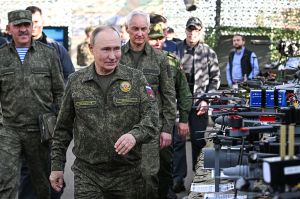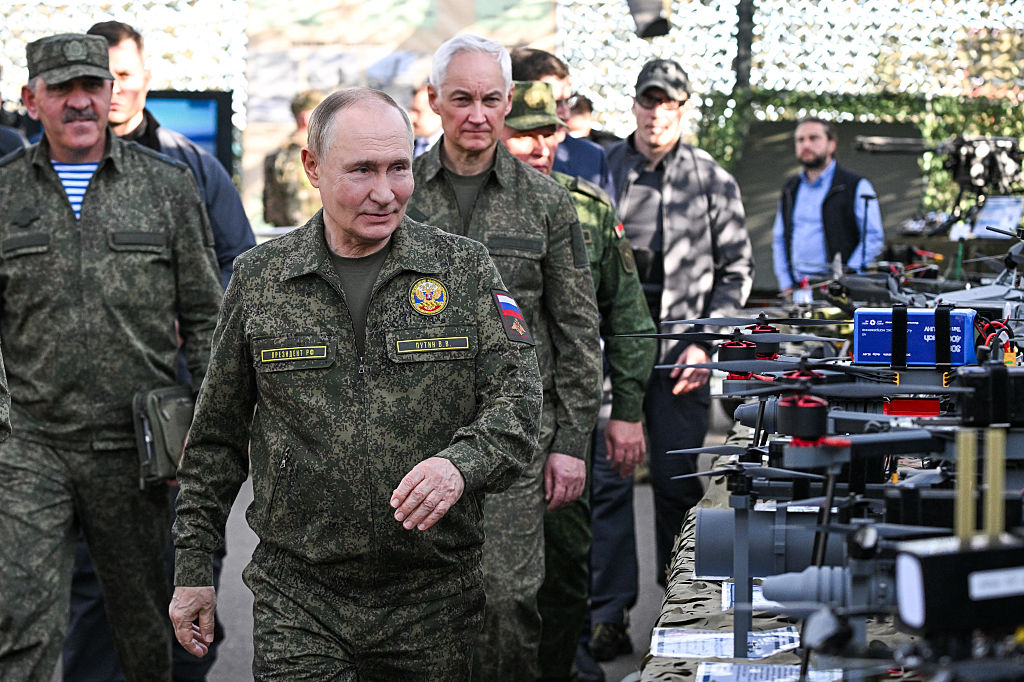Tucker Carlson spoke with Freddy Gray on this week’s episode of Spectator TV. You can watch their conversation here, or read it below:
Freddy Gray: It’s a great honor to be joined by Tucker Carlson… We’re going to continue to be talking about Ukraine.
And Tucker, I think it’s fair to say you’ve encountered quite a lot of criticism in recent days because as far as I can figure out, you are the only mainstream host who is skeptical of the idea that President Biden needs to interfere militarily if Vladimir Putin invades Ukraine. And for that, you have been called a Russian spy and a Russian asset. Democratic politicians have said that your viewers are calling them up to tell them that you’re on Russia’s side. How do you answer this charge that you are on the side of a terrorist?
Tucker Carlson:With a chuckle! But what’s interesting is the presumption in the United States that it’s terrible to be an asset of Russia, but entirely acceptable to be an asset of Ukraine. Which many, of course, in Washington are. The president’s own son worked for a Ukrainian company, and the president himself was deeply enmeshed in the internal politics of Ukraine when he was vice president, and of course, still is today. And I’m not sure why that’s better.
You know, no one in the United States ought to be an agent of a foreign power or promoting foreign interests at the expense of America’s interests. I mean, in a democracy, it’s very simple. The government exists to serve the people who put it in power by voting, and your foreign policy ought to reflect that. Which is to say. your foreign policy ought to serve the interests of the country. Now if its ancillary effects are improving the lives of others, that’s certainly great and virtuous. But if its primary goal is to serve the interests of other countries or their populations, that is, by definition, illegitimate. I mean, that’s the role of church groups and NGOs, and there are plenty of humanitarian organizations. But the US military, the State Department, the White House, the US Congress, even our media, exist for the benefit of the United States period. And they’ve lost sight of that, and that’s the problem.
The argument I’m making against intervening between Ukraine and Russia — I mean, we already have, by the way. We’ve sent billions in what we’re now calling ‘lethal weapons’ (as opposed to what?). But we’ve also sent missile systems and small arms and all kinds of stuff to Ukraine and to neighboring countries. We’re already funding a proxy war. So why would we be doing that? I mean, is there a vital American interest that serves? Perhaps there is. I haven’t heard anyone explain it.
And they go immediately to “you’re working for Vladimir Putin” or something. I have limited interest in Vladimir Putin. I’ve never been to Russia. I don’t speak Russian! Much less Ukrainian. It’s just not a part of the world that has captured my interest. But even if it had, answer my question! What is the vital interest at stake? And of course, they can’t answer it, so they go ad hominem immediately. To me, that’s a very obvious sign of their weakness. If you become hysterical when someone asks you why you’re doing something, then maybe you’re doing the wrong thing.
FG: Well, perhaps there’s a certain insecurity about NATO. In Britain, I know there’s a strong desire to sustain NATO, even though the primary purpose of NATO to win the Cold War has gone. And do you think there’s a legitimate argument to be said that if we allow Putin to expand into Eastern Europe, into non-NATO powers, then he will be buffering up against NATO powers, which we are committed by treaty to support. So it puts Russia and the West at a sort of trigger point that they aren’t at the moment.
TC: OK, well, I guess, but that would be a voluntary trigger, I assume. I mean, the Soviet Union collapsed when I was on my honeymoon. That was thirty years ago. The full collapse happened in August 1991. That was the point at which my father worked for the US government waging the Cold War. So that was at the very center of our family’s conversations every night, at the very same moment that many of these now Russia hawks are making excuses for the Soviet Union, I should point out — irony of ironies.
But in any case, it was a secular regime then. It’s a regime that subsidizes the Orthodox Church now. So maybe that’s the difference. Just a guess. But in any case, at that point, you’d think someone would say, OK, we have all these post-war institutions that have, I think, very effectively, maybe even valiantly, served their purpose. They kept the Soviets from invading Western Europe. That’s great. I was always for that, always for NATO. But at this point, what is their purpose? Maybe we repurpose them. We have a standing army called NATO, so maybe we do something new with it. But no one ever articulated what the new purpose is. And that’s a huge problem.
This is a thing, something that anyone who covers Washington, where I was for thirty-five years, sees every single day: these zombie institutions marching forward toward what no one will ever say. Their original purpose has either disappeared or they failed to achieve it. They’ve been proven ineffective at doing what they were designed to do, but they continue because they’re well-funded. That’s fine if it’s the HeadStart program, which was designed in 1965 to raise the IQ of poor kids. It didn’t work, but we still have it. But if you have an army, if you have a military alliance called NATO, I don’t know — that could be really disruptive unless you have a clear goal.
I mean, this used to be a prerequisite for all military action. Define and articulate the goal. Make it clear to all participants that this is what we’re attempting to do. Look at Imperial Japan — we said we will not stop until you proffer and we accept your unconditional surrender. They wouldn’t. We dropped the atom bomb on two of their cities. OK, got it. Now you could agree or disagree with what we did, but the goal was never in doubt — it was unconditional surrender. So what is the goal of NATO exactly? To protect Ukraine? It’s not a member. I mean, the whole thing is just so crazy and childish. Anyway, you see the point.
FG: If, as some people suggest one day you might be, you were president of the United States, would you say, “let’s scrap NATO”?
TC: You know, as an instinctive conservative, I’m against breaking things without a good reason. I think the first thing I would do is I would assess. We have this thing, we have this military alliance. It’s awfully well-funded and awfully well-armed, relatively speaking. And is there something useful we could do with that? And I think it would be worth pausing. I have not — I’ve been thinking about this for, you know, fairly for three and a half years since Putin met with Trump in Helsinki. I was there and this was a big topic: what’s the point of NATO? And I have not met anyone who could explain how we could do something useful with NATO. Does anyone sincerely believe that Western Europe is at risk of being invaded by Putin? Well, if it is then Western European nations — which I think we at this point can trust to have weapons — should defend themselves. I mean, that’s the idea of the nation state! You defend your own interests, you have a vested interest, you have what we call “skin in the game,” and you ought to defend it if it’s worth something to you. And that system has worked fairly well.
FG: Well, I don’t want to sound like a hawk because I don’t think I am, but I suppose the theory would be if, let’s say Putin somehow takes over Ukraine, which again is doubtful, he would then be up against the Baltic states, some of which are NATO members. So how would you deal with that? What if he invades a Baltic state?
TC: I’m not sure I would. I’m not sure I would deal with — I mean, look, I’m an American. I have no other passport. I’ve got four kids, four dogs and a house. I’m not going anywhere. So from my perspective, as wholly American, I think every country has a different perspective. That’s why I was for Brexit. Each country should be able to represent its own perspective on the world stage. That’s like a baseline view for me. So from an American perspective, I would say, is it — given the competing nature of interests — in the top tier of interests to prevent Russian expansion in Eastern Europe? I mean, it’s not something you’d wish. You want free people to live in freedom.
On the other hand, the freedom of people is threatened the world over. There are ongoing border disputes in Africa, the continent that I’m actually interested in, that have been, going on, grinding on causing the deaths of literally millions for decades! And you know, that’s sad. Nobody wants it to be the case, but is it in our interest to physically prevent it or try to?
We also have a terrible record of actually affecting the desired outcomes. We just withdrew from Afghanistan this fall after the longest war in American history, and rather than pausing to ask “why didn’t that go as expected, what are the mistakes we made, what are the assumptions that led to those mistakes,” we’re on to contemplating an invasion of Russia during winter, because that works!
But I would ask the question. Clearly there are threats to the United States and our interests. Global trade routes. Energy. Pure military power, relative military power comes from China, of course. And so to the extent that you are focused on another region, given the size of our military, our attention span, the limits of our budget, you are detracting from that. And so the question is, is it worth it? And being American, we’re not trained to think that way. We imagine everything is a possibility. The world is a menu of endless possibilities. We can do all of it. But the truth is we can’t and never have been able to. There are limits of physics and money and reality that impose on you.
And so of course, I wish Latvia the best. I would feel sad if Latvia ever lost its autonomy — to the extent it actually has autonomy as a NATO member, but whatever. I would say to myself, “you know, that’s sad, but is intervening, given the realistic possibilities of doing what we want to do, worth it, given that that would detract from the real problems which are east.” Not Eastern Europe, but Far East. So that’s how I would think about it. I think that’s a pretty moderate, sensible, realistic way to think about anything. I don’t think that’s radical. I certainly don’t think it’s taking Putin’s side. I have no special interest in any of this. I only care about my country.
FG: It’s interesting you mentioned China because there’s been a lot of talk in foreign policy circles about the Pacific pivot over the last twenty years in America, and America’s strategic focus now has to move to the Pacific rather than to Europe, the Middle East and Eastern Europe. And of course, the Pacific pivot does actually challenge China. It does challenge China’s ambitions. So it does presumably suit China for America to be focused on Ukraine because it means they care a little bit less about what China’s doing in, say, the South China Sea or something like that.
TC: Needless to say. So, look, I’m not alleging any conspiracy here. I do think there is a feature of human nature that causes, and I think it’s innate, people when confronted with an unsolvable problem to turn to something else to occupy their minds. I mean, this is relevant to your viewers who are journalists. Anyone who’s ever been on deadline for, say, a magazine piece will find himself surely tempted to rearrange his books by author! Because it’s another problem to work on as you ignore the problem that confronts you that you actually can’t solve! China is a problem that is very hard for the United States to solve. It’s not clear how we do solve that problem. By problem, I mean, sort of giving hegemony over the world to a country that doesn’t believe anything, really, that we believe. It would be a massive change in the way the world operates, in the way that we in the United States live, in the way that you in Great Britain live.
Having China in charge of the world would be very different from what we have now. That’s a huge concern, a legitimate concern, I think. And we’re not meaningfully dealing with it. You often hear people on the right say, “Well, that’s because we’re all taking money from China.” Yes, that’s true. Our former secretary of state, Madeleine Albright was a moron, by the way, but got rich as so many have been from effectively making China’s case to the American business community. Many others in our diplomatic corps have done the same. So that’s a straight sell-out. Hollywood sells out, the NBA sells out. They’re controlled by the Chinese government. Everyone knows that.
But I think the deeper problem has nothing to do with commerce. It just has to do with the terrifying nature of this threat and our own fear that we can’t actually do anything about it. So here’s where I would start. Not that I make these decisions, but it’s not a question of pivoting east. China has massive influence within our hemisphere! Go to any island in the Caribbean, including the American colonies. There, we call them protectorates but they’re colonies. St. Croix, Virgin Islands, for example. All the infrastructure in St. Croix is built by China. What?! Why would China be building the airport and the roads in St. Croix. And why are they doing the same in Jamaica and Haiti and virtually every population centre in the Caribbean? Also true in South America, again.
This is our hemisphere, which for more than 200 years we’ve said explicitly, we control. We will not allow world powers from across the oceans to control anything of meaning in our hemisphere. And yet they are. This is being completely ignored. I never heard anybody mention it. I just noticed it from traveling a lot. So I would just start there and say, “What is this about?” Maybe it’s totally benign that they’re building the infrastructure in Bolivia. Maybe it’s not.
FG: I mean, if you were designing American global strategy, you would think isolating China would be good. Therefore, splitting Russia off from China would be good, except for the fact that America’s rhetoric at the moment seems to be driving Russia and China together as as quickly as possible.
TC: That is, of course, the effect. I personally believe it’s one of the intended effects, but what’s so fascinating to me and so repugnant is that clearly there are many people in positions of power in the United States who sincerely believe that we have more in common with China and its government than the government of Russia. Now this is in no way a defense of the way the Putin government operates. You’ll notice I don’t live there. I don’t care to. I feel sorry for Ed Snowden, who is stuck there, etc. etc.
But if we’re being honest and we always should be, we have far more in common with Russia than we have with China. I mean, Russia is a Christian country. No, it’s not any kind of evangelical country or morally upright country. But its culture is rooted in Western civilization, which is another way of saying, and we never say it, but it’s true: Christian civilization and Christianity. I mean, its presuppositions are Christian. Whether it lives up to them, often it doesn’t. The darkest period in Russian history was the period when it ceased to be Russian and became Soviet. And anyway, you see the point.
So, for our leaders, who are very familiar with how both of those countries work, to look at the world and say, “you know, we’re on China’s side,” which is absolutely what they’re saying, reveals something horrifying about them. You can say “I hate Putin, I hate the way he runs that government,” but really? Compared to what? I mean, that’s the other thing: compared to what?
This is a nasty world filled with genocidal lunatics at the helm, not simply of two or three countries, but of a lot of countries and the only reason they’re not committing genocide is because they don’t have the power to. There are a lot of bad people in charge. Always have been. So to decide that Putin is the worst of the lot. Like, you’re lying actually. Or you’re totally ignorant.
FG: Well, your bringing up of Christianity in Western culture, brings up another accusation that is often made against you, which is that you are arousing the forces of ethno-nationalism. How do you respond when people say that?
TC: Ethnonuts! I mean, that’s one of those phrases that half wits in charge of the Atlantic magazine throw around without thinking about. Ethno-nationalism?! I don’t know. I don’t even know what my ethnicity is! I’m like half-Swedish, half-English. I guess it’s not of great interest to me. I can tell you that. I’m an American. I don’t think in ethnic terms. I wasn’t raised that way at all, and I still don’t. And I resist all pressure to. Pressure mostly from the left to categorize myself and everybody as a member of some community or racial group. I hate that shit, and I will never participate in it.
But I would say, what’s so interesting is that the same people who are saying that opposing war with Russia over Ukraine is ethno-nationalism are simultaneously making the case that Ukraine is for Ukrainians! And that the Russians have no right to enter. So in our country, we had two million immigrants unauthorized, illegal, without documents, whatever you call them, come into this country in the last calendar year, 2021: two million. That’s like four times the size of the city of Boston. That’s a massive number of people, OK? Even in a country of 345 million. So a lot of people, unprecedented. And the justification for this is, well, “borders are racist.” People have a right to go wherever they want in search of a better life.
Here, I’m looking at tens of thousands of Russian citizens massed on the Ukrainian border, hoping to get in for a better life. And I’m seeing world leaders say, “No, you’re not allowed to do that — Ukraine is for Ukrainians!” I mean, speaking of ethno-nationalism, why is it if we can import thousands of Haitians illegally, why is it such a lift with the Ukrainians to just let several thousand Russians in?
Obviously, I’m joking. Sort of. I mean, of course I’m joking, but I also think that’s ridiculous. Speaking of ethno-nationalism, what’s the largest ethno-nationalist nation in the world? Well, it’s their closest ally, China. China is an ethno-state. It’s run by and for the Han Chinese. Why do you think the Uighurs are getting so much trouble? Why do you think the Mongolians and the Tibetans are? Because they’re not Han Chinese.
So look, you run your country as you want. I’m not really much of a judger actually. I judge my own country because I live here. But, you know, Bill Kristol is an idiot! “Ethno-nationalism! Fascism!” Got it. Got it, Bill. A guy who couldn’t even run a small circulation magazine is like “I’m in charge of American foreign policy.” Think about what you’re saying! I mean, it’s ridiculous!
And so there are many ridiculous people. I’m ridiculous sometimes. I get it. I have a high tolerance for ridiculousness. It’s the seriousness with which ludicrous people are taken that really scares me. We have a big, important country. You can’t allow dumb people to act stupidly without reacting to it. It’s like, what? It really freaks me out how mediocre our leadership class is. Not just that they’re wrong, but they’re like low IQ. It’s like Bill Kristol is considered an intellectual really, on the basis of what?
FG: Do you now deliberately organize your program to trigger their rage?
TC: No! No, no, I don’t. And by the way, if I’m being honest, I don’t have a great sense of their rage because I don’t like the internet. It hasn’t made me smarter. I make an affirmative effort to turn off all the garbage devices. I don’t own a TV, but I have an iPad and a phone. My whole electronics are right here. And I turn that stuff off at night and I read books. You know, nothing crazy. I read non-fiction books at night. I don’t think the internet has made us wiser or even better informed. And so I don’t go on social media. I don’t go on Twitter reading about myself or whatever. I don’t really know what people say and I’m not that interested. If there’s something important, someone I love will tell me, and I’ll listen carefully. But like, what if David Frum is mad? I worked with David Frum for six years. I know David Frum really well. If David Frum is mad at me, I mean, fine. You know what I mean? I don’t care. Why would I care?
FG: Sorry to move off global politics completely: did you see the reaction to your M&Ms segment on social media?
TC: It’s so funny you said that. I missed it completely, and the only reason I know anything about it is because one of my producers called me today and said this morning, “let’s do a follow-up on that M&M segment,” which I wrote, and I’m not exaggerating, in like six minutes. I mean, it was nothing. There couldn’t have been eighty words in it.
FG: Let’s explain to British viewers what that was. Something happened with one of the M&Ms.
TC: So M&M Mars, the company that makes M&Ms, which are — in case you don’t have them in the UK — these delightful chocolate candies. As you can probably tell, I love candy. I shouldn’t, but I do anyway. So they come out and they’re like, “OK, our cartoon characters, which have been a feature of our advertising for a long time”… and they’re just like little round chocolate candies with legs… “we have realized through some deep reflection that they’re sexist, and the female characters are wearing sexy boots, and now because women matter and women in leadership are so important, we’re going to put them in frumpy, flat soled shoes.”
And so, like, OK, again, I’m personally a supporter of the M&M’s company. I single-handedly keep their stock price high, so I’m not against M&Ms. But I just made the point that women can be in leadership and still wear sexy boots! There’s nothing inherently contradictory about that. You can have women who are still feminine or whatever leading things. And I was mocking. I was mocking it. I was just joking. But apparently people got all exercised. Fine with me.
FG: Well, I think from ethno-nationalism to candy…
TC: The funny thing is, can I just say one thing? I just always think this. I do have some pretty far out views on a couple of different things, but they’re not related to anything political. You know, I have really strong views about nature or whatever that are not mainstream views. However, my views on race or sex or foreign policy are completely moderate. Middle of the road. Ten years ago, my views were not even interesting enough to mention. And my views really haven’t changed. So it’s just so funny to be like this “radical Putin apologist racist.” Really, no! I’m much more conventional than that.
FG: What is your most far-out view?
TC: I hate drywall. I really don’t like unnatural building materials. I really believe in wood and I’m an extremist on the subject and I won’t live in or spend any time in a room whose walls are covered with drywall, which is like paper-covered gypsum. And it’s a very conventional building material because it’s cheap and easy to install. But it’s disgusting and it sucks the life out of you. It’s just enervating to be in a room covered with drywall. So I just won’t. I won’t. It’s not more expensive to panel the room with, say, pine boards like the one I’m in right now, and so I do. I’m not spending any time in a room with drywall or overhead lighting or anything fluorescent. Like, why would I do that? I really believe in natural building materials. Aesthetics are really important to me. Nature is really important to me. And so I’m just not going to do it. I’m never going to stay in a hotel room, if I can help it, I don’t. I don’t want to.
FG: As you probably know, that is your fascistic ethno-nationalism expressing…
TC: Well, it’s funny. Like, architecture really matters to me. And when we were in Hungary last summer, I gave a speech. I never write anything down, so I was just giving a speech. And I just launched into this thing about architecture because I really care about it. I like pretty architecture that elevates the human spirit and not grotesque steel and glass architecture that crushes the human spirit. It’s that simple. I have no complex or brilliant views on this at all. They’re very, very normal views, but I really, really mean it. So I gave this speech. And David Frum said, like, “Oh, he’s Albert Speer! He cares about architecture! He’s a Nazi!” It’s hilarious.
FG: Tucker Carlson, thank you so much for coming on.
TC: Thank you, Freddy. It’s great to see you.
This article was originally published on The Spectator’s UK website.

























